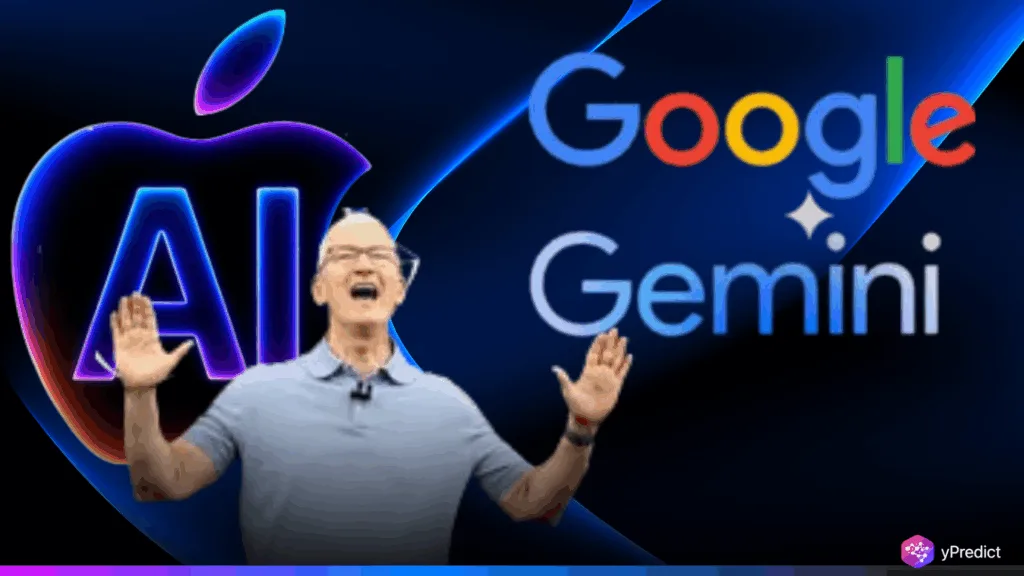
Apple is making a bold move along its artificial intelligence trajectory. They will take Google’s Gemini AI and integrate it into the Apple Intelligence ecosystem, giving notice to its ongoing intent to provide enriching user experiences through increasingly intelligent and adaptive AI.
Apple has long espoused user privacy, security, and user-first design principles in its products. That is true with the introduction of Apple Intelligence’s device-native and cloud-assisted features, increasing productivity and personalization. The most recent collaboration with Google shows Apple is now willing to break its typically silent corporate ethos to catalyze innovation and build tools for Apple to compete with peers in the rapidly evolving AI sector.
This decision also illustrates Apple being willing and embracing competition for user benefit. There has yet to be a dominant AI in the industry, so forming this Apple Google partnership,and quickly, is astute. This collaboration may well redefine AI assistance across multi-device environments and provide an example of defining seamless human-technology engagement.
Why Apple is turning to Google’s Gemini AI
Apple has always been very traditional as a software company doing its own software balancing development for iOS, MacOS, and others. However, the scale of AI development requires partnerships that incorporate advanced models. Google’s Gemini AI is one of the more advanced generative AI platforms with multimodal capabilities across text, image, and even programming assistance.
By using Gemini for its own Apple Intelligence service, Apple can ensure its users have access to the most advanced AI without compromising the company’s core values of privacy and security. With Google’s strong AI research combined with Apple devices, this synergy could be immensely powerful. For Apple, this could save years of proprietary model building, while providing the most advanced features for its users.
This also shows Apple is acknowledging user expectations are shifting. Users don’t just want good AI, they want AI that is intuitive, context-aware, and seamlessly integrated into daily tasks. Gemini has that potential to provide adaptive, real-time AI and reasoning capabilities in Apple Intelligence.
How the Apple Google partnership changes the AI landscape
This partnership will be a windfall for Apple users and upset the balance of power in the AI world. Microsoft has established a substantial path with the introduction of OpenAI’s ChatGPT, while Google continues to push Gemini to the forefront. Apple is now wholly embracing Gemini, which has changed the competitive landscape.
The partnership could also encourage other tech giants to rethink how they collaborate. No longer would companies operate in silos, but instead participate in partnerships that draw on mutual expertise and success. Therefore, Apple’s integration of Gemini could turn into a playbook for others when thinking about collaborations in AI.
Furthermore, the partnership establishes a strong foundation for Apple in the race to keep its devices relevant. Whether it be in iPhones, iPads, or Macs, Apple Intelligence powered by Gemini allows Apple to leverage the same – or even better – AI deployments in their own environment, which equals – or beats – AI capabilities in competing platforms.
Potential benefits for Apple users
For a casual user, the most significant change will be seen in the ease of completing tasks. From better Siri interactions to AI-assisted writing, coding, and image generation, Apple’s Intelligence ecosystem, based on Gemini, could provide a sense of customized and responsive tools.
Privacy will also remain a priority. Apple has always marketed its approach as being focused on privacy by keeping sensitive data on-device when possible. The integration of Gemini will lead to the challenge of how to deliver compelling AI features while still offering strict privacy controls. If successful, Apple could create a leading example of how AI services for consumers should be responsibly designed.
Another advantage is speed of deployment. Since Apple is using Google’s existing models, it seems quite likely that users will be able to access new AI-powered features sooner, rather than later. This helps to accelerate adoption and keep Apple devices at the forefront of innovation.
Challenges Apple may face with Gemini AI integration
Even though integration is exciting, there are challenges to think about. One of the concerns is if Apple can address Google’s Gemini AI with its principles of privacy and ecosystem ownership. Apple has a strong correlation between the brand and user trust. If there is any compromise, then the brand will suffer.
Another concern is differentiation. If Google is delivering AI for its ecosystem and also power an AI for Apple, how can Apple deliver so that their users will have a unique experience? Apple needs to build their own personalization, design, experience, and other parts of the software to ensure Apple Intelligence seems like Apple and not just topical aspects of Google’s service.
And lastly, competition will be intense. Microsoft, OpenAI, and other new entrants will continue to quickly innovate. Apple will need to continuously iterate and keep readers engaged, and work to ensure that Apple Intelligence is more than a product add-on and recognized central to the Apple experience.
Final thoughts on Apple’s AI strategy
Apple’s approach toward successfully incorporating Gemini AI into Apple Intelligence indicates a deliberate shift in strategy in the fast paced race for meaningful AI integration in the company’s product ecosystem. Instead of shunning partnership, in favor of isolation, Apple is now taking advantage of state-of-the-art AI capability with a view to maintain the company’s image of being customer focused independent innovators.
This Apple Google endeavor could be the most significant step toward defining consumer AI’s future. Providing a unique combination of Apple’s hardware, software, and design experience with Google’s AI expertise is going to give users an experience that feels advanced, yet familiar. Even though there will be some bumps in the road ahead this represents a huge opportunity for both companies.
This integration represents a milestone not just for Apple, but also for the global AI industry, where collaboration could pave the way forward.






